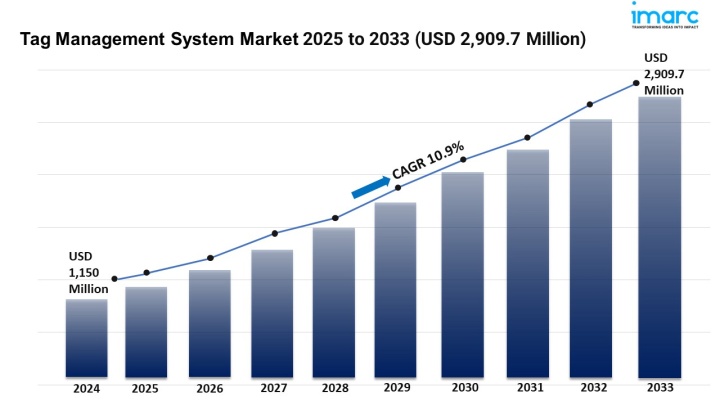

Market Overview:
The tag management system market is experiencing rapid growth, driven by data privacy & compliance, real-time data activation, and cross-platform data unification. According to IMARC Group's latest research publication, "Tag Management System Market : Global Industry Trends, Share, Size, Growth, Opportunity and Forecast 2025-2033", The global tag management system market size reached USD 1,150 Million in 2024. Looking forward, IMARC Group expects the market to reach USD 2,909.7 Million by 2033, exhibiting a growth rate (CAGR) of 10.9% during 2025-2033.
This detailed analysis primarily encompasses industry size, business trends, market share, key growth factors, and regional forecasts. The report offers a comprehensive overview and integrates research findings, market assessments, and data from different sources. It also includes pivotal market dynamics like drivers and challenges, while also highlighting growth opportunities, financial insights, technological improvements, emerging trends, and innovations. Besides this, the report provides regional market evaluation, along with a competitive landscape analysis.
Grab a sample PDF of this report: https://www.imarcgroup.com/tag-management-system-market/requestsample
Our report includes:
Growth Factors in the Tag Management System Industry:
The Tag Management System (TMS) market is experiencing rapid adoption as businesses face stricter data protection requirements under laws like GDPR, CCPA, and emerging regional frameworks. Modern TMS solutions enable organizations to implement data masking, anonymization, and advanced access controls to safeguard consumer data. By integrating with consent management platforms, TMS ensures customer preferences are consistently honored across all digital touchpoints. Server-side tagging is becoming the preferred model, reducing dependency on third-party cookies and minimizing exposure to non-compliance risks. Enterprises are increasingly investing in privacy-centric TMS platforms to streamline governance, automate regulatory compliance, and strengthen customer trust.
Companies are increasingly leveraging TMS platforms to activate customer data in real time, driving personalized engagement and accelerating decision-making. Advanced TMS tools allow instant collection and processing of behavioral data, enabling marketers to dynamically adjust campaigns and deliver hyper-personalized content. Server-side integrations with customer data platforms (CDPs) and data management platforms (DMPs) enhance data flow for faster segmentation and more precise targeting. Organizations are also optimizing response time through automated consent handling, ensuring compliance while supporting seamless digital experiences. By enabling data activation at speed, TMS empowers brands to improve marketing ROI, enhance customer satisfaction, and build stronger brand loyalty.
Demand for cross-platform data unification is rising as businesses seek to understand customer journeys spanning websites, apps, and connected devices. TMS platforms serve as a central hub to consolidate and normalize data from fragmented sources, feeding it into analytics systems, data lakes, and warehouses. This creates a single customer view, supporting advanced personalization strategies and consistent brand experiences across touchpoints. Server-side tagging ensures greater accuracy and eliminates data silos by standardizing information before delivery. Companies deploying unified TMS solutions benefit from more effective segmentation, stronger attribution models, and improved decision-making that aligns marketing campaigns with evolving consumer behavior.
Key Trends in the Tag Management System Market
Integration between TMS and CMPs has become a critical trend as organizations prioritize transparent data usage and customer-centric privacy practices. This ensures that end-user permissions directly influence which tags are activated, eliminating risks of unauthorized data collection. Beyond compliance, this integration builds customer confidence by demonstrating accountability and respect for digital rights. Media and e-commerce companies, in particular, are using CMP-enabled TMS to balance personalization with privacy. This creates cleaner datasets, reduces reliance on unreliable tracking methods, and enables businesses to optimize their marketing strategies without compromising regulatory obligations or consumer trust.
Server-side tagging is gaining traction as a solution to client-side limitations such as ad-blocker interference, slow load times, and inconsistent browser behavior. By moving tag execution to servers, companies achieve faster website performance, improved analytics accuracy, and enhanced control over data distribution. This approach also reduces risks of unauthorized data leaks, making it a preferred choice for industries handling sensitive information like finance, healthcare, and insurance. Many organizations are deploying hybrid setups that combine client-side and server-side tagging to maximize flexibility. The trend reflects a broader industry push toward scalability, security, and operational efficiency in digital data management.
AI and automation are revolutionizing tag management by reducing manual workloads and optimizing data workflows at scale. Intelligent TMS platforms now use machine learning to detect redundant tags, predict performance bottlenecks, and automate tag deployment. Automated monitoring tools identify misfiring tags and self-correct issues, minimizing downtime and improving overall analytics reliability. For example, e-commerce platforms utilize AI-driven TMS to dynamically adjust tags during traffic spikes, ensuring smooth user experiences without data loss. This trend is enabling businesses to focus on strategy rather than operational fixes, unlocking greater efficiency, accuracy, and long-term sustainability in their analytics ecosystems.
Leading Companies Operating in the Global Tag Management System Industry:
Tag Management System Market Report Segmentation:
Breakup By Component:
Tools exhibit a clear dominance in the market as businesses prioritize comprehensive solutions that enable efficient deployment, monitoring, and optimization of multiple tracking tags without requiring extensive technical resources.
Breakup By Deployment Model:
On-premises represent the largest segment because organizations prefer the enhanced security, customization, and control it offers over their tag management systems, ensuring data sovereignty and tailored configurations.
Breakup By Organization Size:
Large enterprises hold the biggest market share due to their extensive digital operations, complex tagging requirements, and greater investment capabilities in advanced tag management solutions to support their expansive marketing and analytics initiatives.
Breakup By Industry Vertical:
IT and telecommunication account for the majority of the market share since these industries extensively utilize tag management systems to handle vast amounts of data, optimize digital marketing strategies, and ensure seamless integration across diverse digital platforms.
Breakup By Region:
North America dominates the market owing to stringent data privacy regulations, driving organizations to adopt sophisticated tag management systems to ensure compliance, secure data handling, and maintain trust.
Note: If you require specific details, data, or insights that are not currently included in the scope of this report, we are happy to accommodate your request. As part of our customization service, we will gather and provide the additional information you need, tailored to your specific requirements. Please let us know your exact needs, and we will ensure the report is updated accordingly to meet your expectations.
About Us:
IMARC Group is a global management consulting firm that helps the world’s most ambitious changemakers to create a lasting impact. The company provide a comprehensive suite of market entry and expansion services. IMARC offerings include thorough market assessment, feasibility studies, company incorporation assistance, factory setup support, regulatory approvals and licensing navigation, branding, marketing and sales strategies, competitive landscape and benchmarking analyses, pricing and cost research, and procurement research.
Contact Us:
IMARC Group
134 N 4th St. Brooklyn, NY 11249, USA
Email: sales@imarcgroup.com
Tel No:(D) +91 120 433 0800
United States: +1–201971–6302
